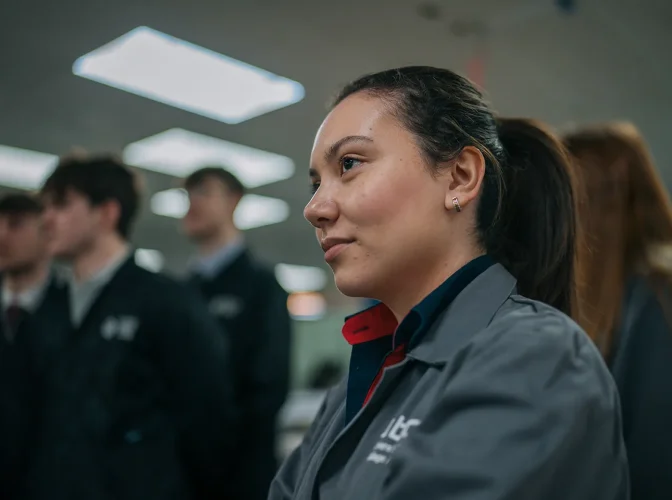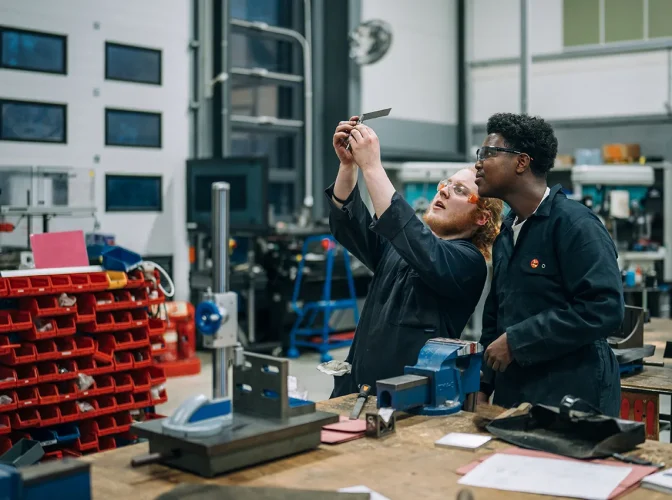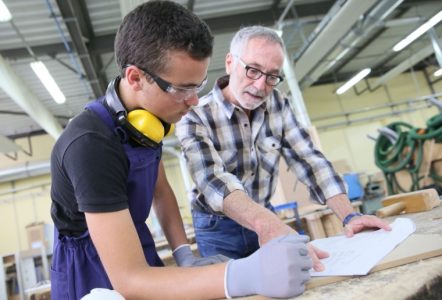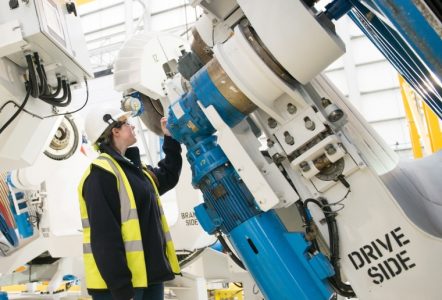
England’s technical skills shortage
England faces a shortage of higher-level technical skills. Only 10% of adults in England hold a Level 4 or 5 qualification as their highest – well below countries like Germany (20%) and Canada (34%). This “missing middle” in the skills system hampers innovation and productivity, particularly in sectors such as digital, engineering, and advanced manufacturing.
Since the Sainsbury Review, The Gatsby Foundation has played a central role in raising the profile of Higher Technical Education (HTE) at Levels 4 and 5 in policy discussions, and increasing awareness of these options among potential learners.

What are Higher Technical Qualifications?
HTQs are Level 4 and 5 qualifications developed in partnership with employers and approved by Skills England. They meet rigorous quality standards and align directly with occupational needs, covering much of the same content as a higher level apprenticeship. HTQs provide flexible, affordable pathways into skilled employment and opportunities for those already in work to take their career to the next step.

Why HTQs matter
HTQs offer practical, quality-assured higher education options with a strong focus on the workplace.
- Learners benefit from flexible, affordable options – often part-time – making it easier to earn while they learn, progress from T-levels or apprenticeships and move into rewarding careers. HTQs are aligned to the same occupational standards as higher-level apprenticeships, ensuring their content is directly relevant to real workplace needs.
- Employers gain access to talent trained in industry-relevant skills, helping tackle sector-specific shortages. HTQs also offer a practical route for upskilling existing staff, helping businesses adapt to new technologies and evolving demands.

How Gatsby is supporting HTQs
Gatsby has worked with DfE and IFATE (the predecessor of Skills England) to develop the process by which Level 4 and 5 qualifications are now approved as Higher Technical Qualifications, and continue to explore how to make this process work well for awarding bodies and providers. It is important that this process is as manageable as it is meaningful in terms of aligning those qualifications with employer-led occupational standards.
We support the collation of resources for HTQ providers into one place, and work with stakeholders to hold events for colleges and universities interested in offering HTQs. The HTQ quality mark was introduced in 2020 and it may take some years before it is widely known and understood. Our research spans international higher technical education systems, the HTE landscape in England, and progression pathways into and out of HTQs, ensuring policy is grounded in robust evidence.
Shaping a stronger HTQ system
To build a robust future for HTE, our strategic focus for HTQs is:
Collaborating with partners across education, industry, and government to shape the future of HTQs and ensure continued development.
Increasing recognition and understanding of HTQs among learners and employers, particularly through Institutes of Technology, and support providers in delivering high-quality teaching.
Championing policies that prioritise higher technical education and promote a coherent, integrated framework that connects T-levels to higher-level qualifications.
Higher Technical Qualifications have the power to transform our skills system, creating new routes to opportunity and building a workforce to drive positive change in our economy.
Reports & publications
Mind the Technician Gap: Fixing the UK’s hidden labour crisis
Technicians are vital role in building future industries, but are often an afterthought with a fragmented approach to training and reskilling. This report sets out the scale of the challenge, and what must change to meet it – placing technicians at the centre of workforce planning, investment, and industrial strategy
Author(s)
Harry Carr, Mariano Mamertino
Responding to Higher Technical Skills Needs
This report explores employer and employee decision making about training and the development of higher technical skills, providing insights to inform how national and regional policy can support changing skills needs and drive productivity.
Author(s)
Mags Bexon, Danny Price, Jack Bradstreet, Corin Egglestone, Rachael Owen
The Higher Technical Qualification (HTQ) Approval Process in England: A Review
A new report by Professor Elizabeth Cleaver explores the experiences of providers navigating the HTQ approvals process and offers insights for Skills England to advance the UK’s ambitions for a stronger, more inclusive technical education landscape.
Author(s)
Professor Elizabeth Cleaver
Where Next? Who Applies to Level 4 and 5 Qualifications
A report exploring the motivation and experiences of people who apply to Level 4 and 5 courses (SCQF Level 7 and 8 in Scotland) through UCAS.
Author(s)
UCAS
Local Areas Programme: Summary report
Report from the North East Local Enterprise Partnership looking at best practice and lessons learnt in implementing coherent technical education strategies including T-levels in 5 local areas: Greater Manchester, Lancashire, Liverpool, Sheffield and West Midlands.
Author(s)
Kim Smith
Research into the funding for and costs of higher technical education
acl Consulting research on the funding of and costs associated with higher technical education (HTE) in higher education institutions [HEIs] and general further education colleges in England.
Author(s)
acl Consulting
Beyond the Missing Middle: Developing Higher Technical Education
This report by Simon Field follows his earlier report 'The Missing Middle: Higher Technical Education in England', and looks internationally for answers to how England can develop and improve its higher technical system.
Author(s)
Simon Field
Making a market for the missing middle: Higher technical education
This report, commissioned by Gatsby Education and undertaken by the Learning and Work Institute, explores how a higher technical education offer with a focus on industry-specific skills, could help to address the needs of local people, local businesses and the local economy.
Author(s)
Emily Jones, Fiona Aldridge, Helen Plant, Connor Stevens,
Manufacturing the Future Workforce
This report by the High Value Manufacturing Catapult (HVMC) and supported by Gatsby Education, argues that the UK needs a new Skills Value Chain in which Catapults are key to develop the workforce for a successful innovative future.
Author(s)
Ian Collier, Paul Shakespeare
Key Indicators in STEM Education 2020
The fifth edition of Key Indicators in STEM Education, bringing together key data relating to Science, Technology, Engineering and Mathematics (STEM) education, focusing on trends in the numbers of individuals studying STEM subjects at GCSE, A-level and undergraduate degree levels.
Author(s)
The Gatsby Foundation
Technicians and Higher Technical Education Spring Summits 2019
This report summarises points raised by thirty employers from the land, construction and water industries, when they came together over the course of three summits at the Gatsby Foundation in spring 2019 to discuss the future of higher technical education.
Author(s)
Dougal Driver
Secondary Teachers' Views on Post-18 Options for Students
In June 2019, Gatsby commissioned Pye Tait Consulting to undertake a short piece of research to gather the views of secondary teachers on post-18 options available to students. Key issues which this research sought to address are:
· The level of understanding of higher education routes amongst secondary teachers;
· Views on how students should be informed of post-18 options;
· Important influencers on students when making decisions on post-18 routes;
· How students gather information about post-18 options
Author(s)
Pye Tait Consulting
Technicians and Innovation: A Literature Review
This report commissioned by the Gatsby Foundation and authored by Professor Paul Lewis, Economics Professor at King's College London, explores the direct and important contributions technicians make to both radical and incremental innovation in advanced manufacturing in the UK.
Author(s)
Paul Lewis
The Missing Middle: Higher Technical Education in England
This report explores how the higher technical education system in England reached the point where it is today and how current provision compares with other countries.
Author(s)
Simon Filed
Level 4 and 5 provision in England: provider perspectives
This report explores provider perspectives on Level 4 and 5 technical education in England. It examines viability, labour market influence, and widening participation across 23 post‑16 institutions.
Author(s)
Tim Allan, Michael Dodd, Sophie Elliott
Post-18 education and funding review
This paper responds to the 2018 Post-18 Education & Funding Review, arguing for stronger higher technical education (Levels 4–5) and urging urgent reforms to reverse the decades of neglect of HTE in England.
Author(s)
Lord Sainsbury of Turville
Mapping the Higher Technical Landscape
This data report provides a detailed overview of Level 4/5 provision delivered in 2015/16 by both FE providers and Higher Education Institutions, broadly mapped to the 15 technical education routes.
Author(s)
Richard Boniface, Graham Whalley, David Goodwin
Assessing the economic returns to Level 4 and 5 STEM-based qualifications
In February 2017 we commissioned London Economics to explore the relative benefits associated with level 4 and 5 STEM based qualifications. This report analysed the lifetime labour market returns (to the individual and the public purse) associated with higher education at levels 4 and 5.
Author(s)
Dr Gavan Conlon, Ms Maike Halterbeck
Building our Industrial Strategy
Gatsby’s response to the UK Government’s 2017 Industrial Strategy Green Paper, urging stronger investment in technical education, better funding for skills training and action to address technician shortages.
Author(s)
The Gatsby Foundation
Knowledge and Technology Transfer (KTT)
Experience from 16 years of support to Knowledge and Technology Transfer and Exchange projects by the Gatsby Charitable Foundation.
Author(s)
Gatsby Charitable Foundation
Physics in Schools and Universities – Patterns and Policies
One of six Gatsby-commissioned reports on physics education. This report focuses on patterns and policies.
Author(s)
Alan Smithers, Pamela Robinson


